I had a lot of cat moms and their kittens. So, when the daughters became sexually mature, they always became rivals to the cat moms and got a lot of hissing from them. Then, as a rule, everything calmed down, but loving each other, they never became.
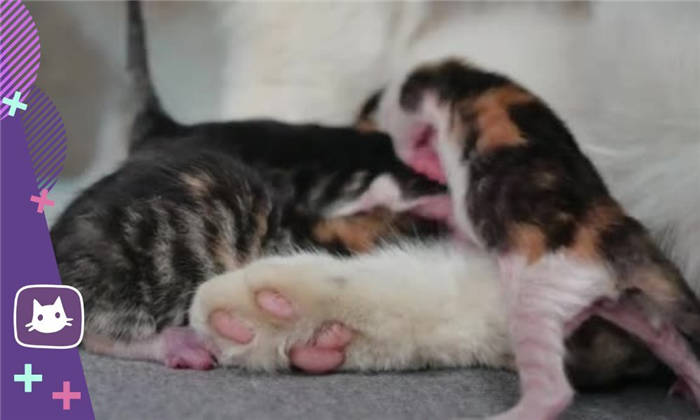
- Why does a cat hiss at her daughter?
- How to make friends with a mother cat and a son cat
- The older cat hisses at the new kitten,
- The mother cat attacks her daughter. How to solve the problem?
- 😾Why does a cat hiss and bite its kittens?
- A cat hurts her kitten.
- Why does the cat behave aggressively?
- How to deal with aggression in a cat
- Why does a cat hiss at kittens?
Why does a cat hiss at her daughter?
A cat hisses at her pregnant daughter (11 months) and paws, but only when she gets too close. This has never happened before.
Cats are not social animals and they have no concept of kinship.
Here's my question too. Why the fuck would you let a cat get pregnant at 11 months old?
Because cats have no concept of kinship. An 11-month-old daughter is just an adult cat in the eyes of the older cat.
The fact that the younger cat is pregnant aggravates the situation. It is absolutely normal for cats to kill each other's kittens: other cats' kittens are easy prey for the other cat, and killing them is also a way to get rid of competitors claiming territory and resources. Every cat wants to keep its own offspring and does not need other cats.
Also the pregnant cat's smell may have changed.
Therefore, if you want kittens, make sure that the older cat does not get to the babies. Otherwise she might eat them or strangle them. And the mother cat herself might kill them: all the more so, as the cat is too young for pregnancy (she was not one year pregnant when she got pregnant, and she will mate not before her third heat), the first births, another cat on the territory will create stress.
Kittens are "children" for the cat until 3 months, and then they are rivals in her territory. Castrate both of them to have less reason to share territory and not to undermine their health by giving birth.
The daughter has grown up. For the mother cat, she is no longer a daughter, but just an adult cat.
I have the same hissing at each other.
How to make friends with a mother cat and a son cat
I have a Siamese cat, lilac point, 11 years old. Gentle, but with a temper. My son was little, what he did to her (dragged her, lay on top) not once bit him, not scratched, just tried to get away. At the same time behaves like a mistress: you can not talk loudly: he comes, sits down next to her and howls, but tries to bite her close to the face. Guards the house like a dog, growling, etc. We live in our own house. Goes for a walk – rides, howls, and does not let the cats, hisses.Yes vid, they still clamped her. 4 times she brought kittens, non-bred. Last time, brought in September 2009, and one somehow turned out almost her breed, a boy. We decided to keep it. There was a complete idyll, they took care of each other, she guarded him, protected him, introduced him to the territory. But the situation changed. The cat is now 8 months old. She started hissing at him, raising her paw, chasing him. He was already shy and cuddly, and now his mother won't let him go home. So it gets to people. You pass by her – pawed, especially if before this cat stroked. To my remarks, they say, so can not, responds, talks, and leaves. I understand that the boy grew up, we decided to neuter him. But the question, and whether it helps? Or maybe it is a manifestation of the breed?
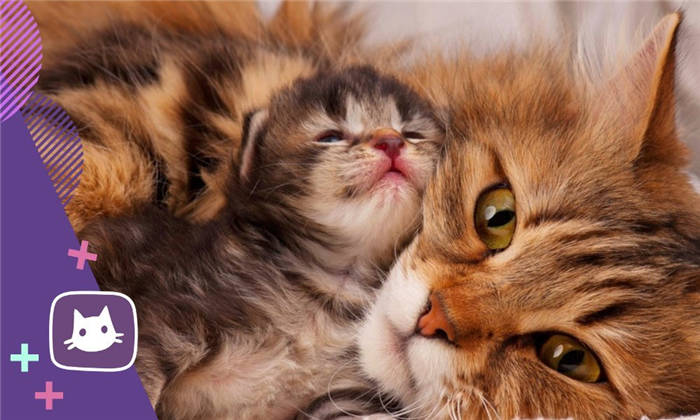
And the son, and the mother, castrate, otherwise he is about to "clamp" her, and nothing good will come of it. Your cat shouldn't give birth any more – 4 calves is quite decent, normal breeders don't allow breeding cats to give birth more than 5-6 times in their lifetime, they get them neutered. So they carry them in their arms during pregnancy, and I think your cat doesn't get any special care during that time, her body is probably already pretty exhausted. Even with the next calving sick kittens can be born, problems with pregnancy and health of the cat itself are possible. And neutering will most likely smooth out the aggression, because the hormonal background will level out.
Now the cat has no maternal instinct towards her son, cats in general have no concept of "kinship", as soon as the children grow up, they become strangers, and the son may well breed his mother, and kittens from inbreeding are usually born with various abnormalities.
The older cat hisses at the new kitten,
On Friday we got a 2 month old kitten.There is an older Siamese cat of 15 years. I am afraid to let the little one out, as the older cat hisses, howls and tries to rush at him.Therefore I keep in different rooms.I try to feed them together, mix their smells, stroke the older cat. Is there any chance they will make friends? The kitten is very playful, the older cat is frightened. Gathering experience.
My experience is unlikely to help you, my eldest, 9 years, still growls and hisses at the "youngsters" we had before Easter 
They need more time, very often – I just read on the forums that, adult cats in many longer get used to the new tenant, who has a month, who has a week, who has 3 months.I then have 2 kittens almost the same age – was enough a couple of days, but the girl, still, the boy is jealous of me, and then I hissed and biting and did not go to the hands. that is, I was in full ignore of her, now if she sees that I am a boy stroke, immediately makes such eyes. that … uh … just want to put it. away from myself)))) so a little by little give them time. i have worse … we also have a dog … he is already thank God used to, but the thing is that the girl is afraid of him mortally, and the boy … almost not afraid, but very cautious))) and also sit kittens in one room, and the dog in the rest of the apartment. still hope that a miracle will happen … and they will all lie together in the big room. And don't forget to pay more attention to the adult cat… And the little one, at least for a minute, take him out of the other room and introduce him from a distance and tell him that he's nice and that kitty (the grown-up clever one, etc.)
Get used to it, do not worry. We started taking our little guy out in public view in their arms (we also have a cat, cat, and dog), a little sniff of their hands, covering him. And then we take the little one back and make sure that we pet, caress, and talk to them. We even had to put a muzzle on the dog, and he thought he was a mouse, and eagerly licked. The cat was quicker to accept the little one, the cat hissed and howled at him at first, then calmed down too (I let the little one run around, and held her in my arms and stroked her). Now sometimes the cat can put his paw on him, but he is 3 months old and he is not very afraid of her, leave, and then starts to climb again.
The mother cat attacks her daughter. How to solve the problem?
My cat is 3 years and 9 months. In September 2010 she gave birth to her 3rd litter of kittens. The delivery and rearing of the kittens went well. We decided to keep one of the kittens from this litter. The kitty is now 4.5 months old. On New Year's holidays we went out of town, to our dacha. We stayed there for 6 days. On the 3rd day of our stay at the cottage, the kitten was very frightened of the sight of our grandfather in unfamiliar clothes, ran away and was suddenly attacked by the cat-mother. We had to separate the cat and the kitten and put them in different rooms. After the skirmish, the cats were not allowed near each other. On the way back from the dacha, the kitten was in the carrier, her mother was riding in my arms. I sat next to the carrier with the cat mom, and the cats could sniff around. There was no aggression on either side. In the Moscow apartment, about 30 minutes after I arrived, I let the kitten out of the carrier, cat mom walking around the apartment. The kitten immediately recognized her home and was very happy. The kitty came up to mom and started sniffing and petting her, but she got hit on the head with her paw, and after a while mom cat attacked her again, screaming. Now for the second week, I've been keeping the cats away from each other.
I feed the cat and the kitten premium dry food. Both cats are vaccinated and healthy. I regularly show the cats to the vet and have them tested before mating and vaccinating.
My concerns in this situation are: What are the reasons for this behavior of the mother cat and Can this situation be corrected?
The behavior you described may be caused not only by the frightened mother cat, but also by the increasing stress of being a teenager – as kittens get older, cats may begin to push them away from themselves.
However, it is more likely, as you yourself have noticed – to be the consequences of an outwardly insignificant conflict that has led the mother cat to reinforce the undesirable behavior. You have to bring the cats together (reconcile) very carefully, about this scheme:
http://www.zoovet.ru/text.php?newsid=490
How is their relationship now?
😾Why does a cat hiss and bite its kittens?
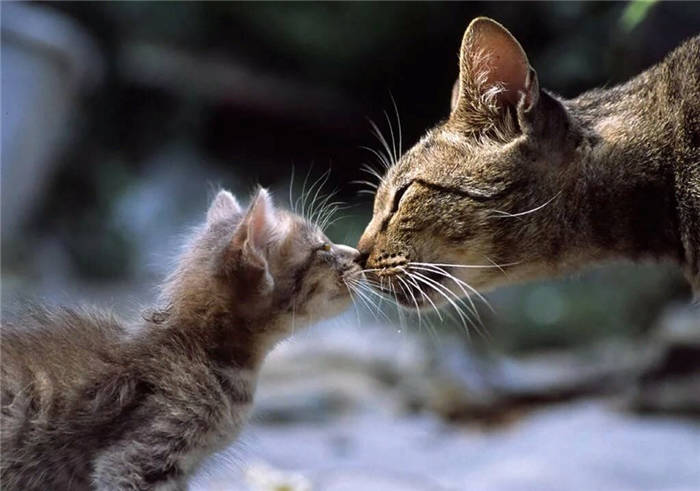
Cats are great mothers. They selflessly care for their cubs and are willing to protect them from anyone. And yet sometimes kittens get a beating from their mothers.
Where do the motherly feelings of cats disappear, and what does this behavior mean, depending on the age of the babies?
The hissing at a tiny kitten who only eats mother's milk is a worrisome sign. Half the trouble if the problem is someone else's scent (like human hands).
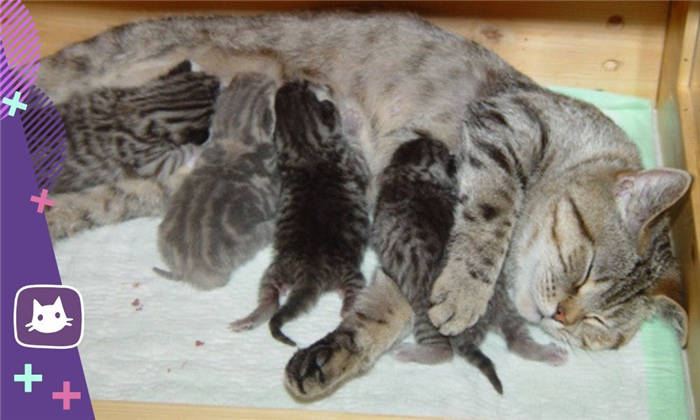
Keep an eye on the cat for a while. Chances are, the kitten will begin to smell properly again, and it will be welcomed back into the family.
However, sometimes cats refuse kittens that have been touched by humans, and those have to take up a pacifier bottle.
Worse, if the cat has lost its milk, and the kitten is trying to get it: the baby's efforts are in vain, and its mother is hurt and unpleasant, so she hisses.
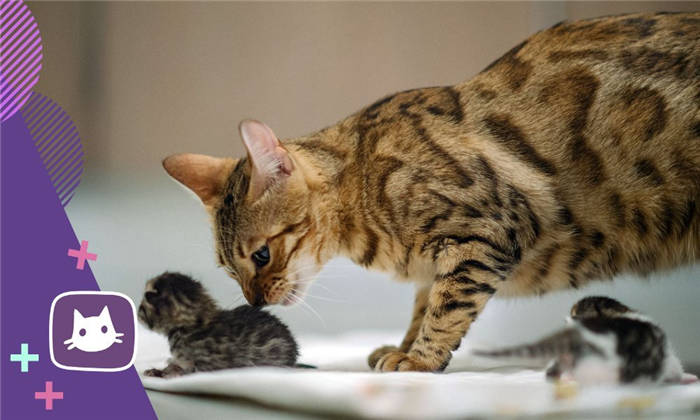
Or, for example, the baby is weak, the mother cat's instincts tell her that it will not survive, and she does not want to waste milk "for nothing". Most likely, you will have to feed the kitten yourself.
Sometimes a cat will hiss at babies if the situation seems dangerous to her. This is her way of warning you to stop fiddling and lay low.
Kittens at the age of one month to two or three months are actively educated by the mother cat – and punished for inappropriate behavior. Plus, it's time for them to eat their food and stop sucking on milk.
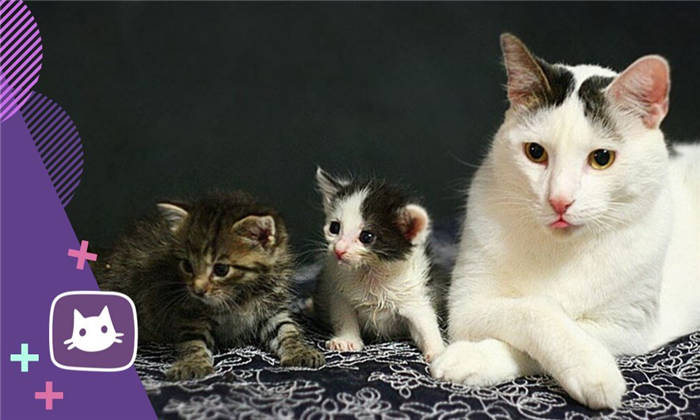
Cubs can let their claws out in play, and when trying to get a little more of their mother's milk, they often hurt the delicate skin with their sharp teeth, so the mother is outraged.
A cat hurts her kitten.
A cat hurts her kitten. I left a kitten from my own cat. the kitten is now six months old. A very affectionate and playful girl. Mama cat (cuckoo) beats her, growls, hisses, pounces. I suspect that she is jealous because the kitten is being petted by the whole family. question: what to do? if you spay the cat – will it help?
You practically have two cats at home now and it's clear that the older one is the mistress and now the other cat is a competitor for her, i.e. for an adult cat it's no longer a baby but a competing individual:) Try reading here http://vsookoshkax.ru/polezno/kak-podruzhit-koshek.htm
Actually, the mother cat and the daughter cat have kinship ties that last almost their entire lives if they live together. That's weird.
And I don't think everyone does, maybe it's the breed. Well if a mother cat can give birth to her own baby cat when the cat is already at childbearing age, why would one be surprised. Or is it different with a mother cat and a baby cat?
Nothing strange, if the cat mom dominant, her daughter is no longer a child, and a stranger's cat in her territory. I myself have such a mom and daughter live, we fought over their reconciliation, in the end gave up (after the younger cat began to go to the toilet in the apartment, as she was afraid to pass her mom to the litter box), live for 1.5 years on different rooms and are happy, but the cat mom still wants to find a moment to get into the room to the junior and beat her.
It seems to me that the cat is jealous, and to my husband that she is pointing out "her place" to her daughter.
Grew up, then grew up, but the little girl still wants to play with his mother / lie down, and this "mummy" beats her, does not play with her.
Formally she is still a kitten and wants to play, but physiologically she is an adult cat, and her heat is not far off. Then, not all cats sleep peacefully in the same basket. Coexist without fights, but no fussy pussy. Is the older one a valuable producer? Sterilize, and the aggression is mostly gone. Then look at the situation. You have to be the main cat there, do not make friends, but make it clear that you will not tolerate pushing. And not just the older one. The little one can provoke even more.
Why does the cat behave aggressively?
Aggression is aimed primarily at asserting dominance, explains Sharon L. Crowell-Davis, M.D., a veterinarian, in her article for VetFolio. It can take more covert forms than overt aggression. In fact, it is because cats do it very inconspicuously that you may not even realize one of your pets is misbehaving.
"Some lead cats are aggressors, meaning that they regularly exhibit significant dominance and aggression toward the other cats, even when the latter clearly signal submission and try to avoid interaction," Dr. Crowell-Davis writes. This type of aggression usually occurs in socially stable families that are not stressed by outside factors. In this case, one of the cats wants to assert its dominance over important aspects of cat life such as food, water, litter box, toys and sleeping areas.
In other words, some cats just want to be the boss. This desire may intensify with age, the ASPCA states. If there is increased aggression or other behavioral changes in an aging cat, a veterinary professional should be consulted.
How to deal with aggression in a cat
Living with an aggressive cat is stressful for all family members, including humans. In order to curb hostility from one of the cats, you should start by closely observing its daily activities for signs of latent aggression. A cat's display of aggressive or dominant behavior does not necessarily mean that it is an aggressive or dominant animal.
"Aggression is not a diagnosis or character trait of a cat, but a consequence of an emotional state," International Cat Care explains. The aggressor cat – or any cat, for that matter – should not be physically punished because that can lead to even more fear and more aggression. Instead, efforts should be directed toward calming the aggressive cat.
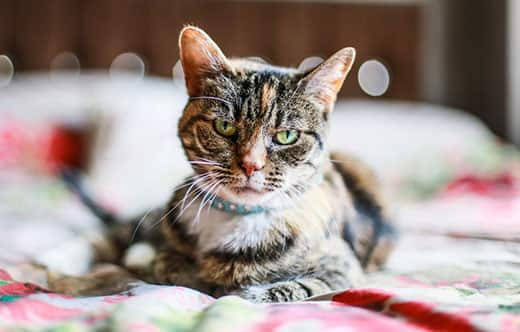
To do this, rough play and fights should be discouraged because they can contribute to aggression. You can feed the cats in different places and set up more litter boxes to make each cat feel like it has its own territory. You can also double the number of cat toys and sleeping places.Pets sometimes don't want to share their owners. If a cat hisses or growls when another cat snuggles up to its owner, it is trying to reinforce its dominance. By safely removing the aggressor cat from the scene, the owner will let the cats know that such behavior is unacceptable. But you should never interfere in a fight between cats, lest you get hurt. It is worth diverting their attention by making a loud noise or throwing a toy in the opposite direction.
Positive reinforcement of good behavior should not be forgotten, as it can take weeks or even months to bring about a change. If a cat's aggression toward another cat is put excessive, you should talk to your veterinarian to rule out a health problem.
Why does a cat hiss at kittens?
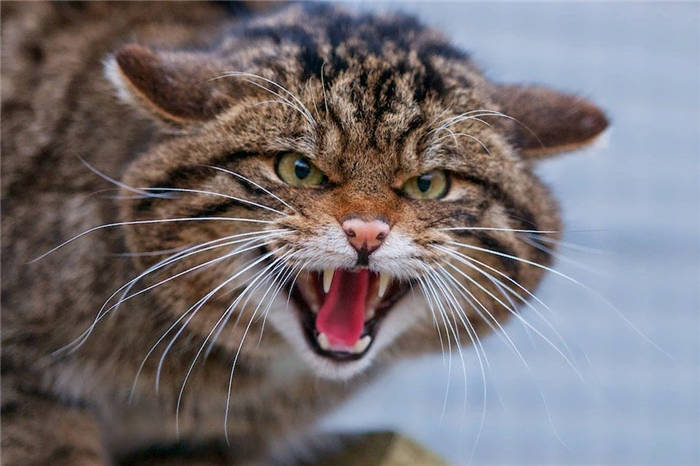
Definitely cats have their own language that they use to communicate with other individuals. But the relationship between a mother cat and her kittens is a separate world, just like humans, filled with nurturing. Observing such communication, you may notice how the adult cat hisses at the babies. What could this mean?
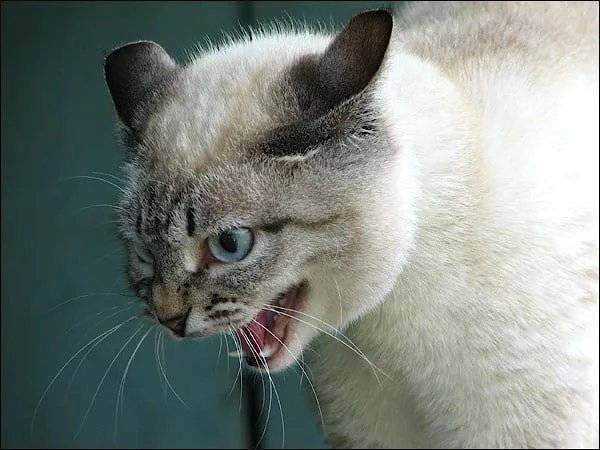
By hissing at the kittens, the cat is letting them know that there is danger nearby. This is a purely natural communication mechanism between mom and the babies to keep them quiet and quiet.
The hissing of the mother cat is a kind of life school for kittens. From childhood the cat teaches the babies that life is not going to be easy and not always pleasant, so when the kittens are playing around, the mother grounds their mischief this way. Kittens in this case may even respond with a semblance of hissing, showing that the mother's instructions are heard and accepted.
An extraneous smell may also be the reason for the cat's aggression toward the kittens. After human hands, the scent changes and the mother rejects the babies, no matter how related they are to her. Aggression can get to the point where the cat rejects her kitten altogether and no longer cares for her.
The hissing is a sign of natural selection. If the cat decides she doesn't have enough milk for the weakest ones, she may start hissing and growling away from them.
The cat may hiss at the kittens if she finds herself pregnant again or just not feeling well. This is a sign to the kittens that mom is gaining strength and she doesn't have the time or resources for them.
During feeding, hissing is natural if the kitten bites the nipple too painfully. Then the cat hisses in pain and demands to be softer.
When the kittens are older, mom may perceive them as already competitors in the pack and also reward the growl or hiss as an equal.






